In the second phase of MCEC, we have welcomed many new members. In this rubric we will introduce them to you.
Sander Huisman (UT)
… is an assistant professor in the Physics of Fluids group at the University of Twente.
In the second phase of MCEC, we have welcomed many new members. In this rubric we will introduce them to you.
… is an assistant professor in the Physics of Fluids group at the University of Twente.
On Sunday October 4th, MCEC Member Ward van der Stam will be present at ‘Operatie Breinbreker’, a science festival where children and their families can get a glimpse into the day-to-day work at Utrecht University through experiments and workshops.
The event will be streamed live and starts at 10:45 AM.
Livestream: https://www.uu.nl/operatie-breinbreker
On Thursday morning April 9, MCEC hosted a substitute online event for the Annual Meeting 2020. The event was used as a test for meeting online, via the MS Teams software. In two hours, the 52 participants listened to the presentations of PhD candidates Petra Keijzer (UU), Thomas van Swieten (UU), Peter Dung (UT), Jasper Lozeman (UT), Laurens Mandemaker (UU).
During the break it was possible to scroll through the uploaded posters.
All in all, we look back at a successful online meeting. We learned a lot and the experience gave us many ideas for future meetings.
Thank you for attending, your questions and overall interaction on the MS Teams platform!
MCEC Member Prof. Marjolein Dijkstra (UU) has been granted an ERC Advanced Grant. This is the highest research grant of the European Research Council, annually granted to exceptional and trailblazing senior researchers. Prof. Dijkstra will receive 2.5 million euros for her project Rational Design of Soft Hierarchical Materials with Responsive Functionalities: Machine learning Soft Matter to create Soft Machines.
More information about the project can be found on the website of Utrecht University.
–
30 March 2020
MCEC Researchers from Utrecht University Bert Weckhuysen (co-applicant a.o. Florian Meirer) and Alfons van Blaaderen (co-applicant a.o. Laura Filion) have received an ‘NWO ENW Groot’ grant.
With these grants, the NWO domain Science stimulates curiosity-driven, non-programmed fundamental research. Grants within the NWO Open Competition ENW Groot program are intended for consortia in which research groups create added value through collaboration.
More details about the two projects:
Nanoplastics: Origin, Structure and Fate
Prof B.M. Weckhuysen, Utrecht University
Troubling images, showcasing the large amount of plastic litter that contaminates our waters and threatens wildlife, have become a regular focus of the popular media. Not everyone realizes that we cannot account for a very large fraction of the plastic that escapes into the ocean. A significant portion of this “missing plastic” is hypothesized to result from the degradation of plastics and are named nanoplastics. A multidisciplinary team will now use a breakthrough approach to investigate the formation, presence, and distribution of nanoplastics in aquatic environments. They will study size, structure, and composition of nanoplastics, their transport across the ocean, as well as their interplay with and impact on the Earth’s aquatic microbiome. The reactivity of nanoplastics will also be assessed, allowing to investigate potential degradation pathways, including those involving microbial interactions.
Self-Assembled Icosahedral Photonic Quasicrystals with a Band Gap for Visible Light
Prof A. van Blaaderen, Utrecht University
Photonic crystals are important for many research areas and applications because they enhance the interaction of light with matter in an unprecedented way. Here we plan to make both periodic and quasi-periodic photonic crystals by using colloidal self-assembly, an inherently scalable and inexpensive approach. These crystals will have a so-called photonic bandgap for visible light, the equivalent of an electronic bandgap for electrons. The study of such structures, and how they can influence light, will not only provide new fundamental knowledge about quasicrystals but will also have applications in e.g. data manipulation, lighting, sensing and photocatalysis.
More information about the NWO ENW Groot Grant can be found in the pressrelease.
On Friday January 24, the first ever joint doctorate degree of the MCEC Research Center was granted to Jeroen Vollenbroek. Jeroen Vollenbroek received his PhD degree from both University of Twente and Utrecht University.
Collaboration
The PhD thesis of Jeroen Vollenbroek proofed a fine marriage between microreactor technology and catalysis. Each chapter is based on the collaboration between Prof. Albert van den Berg from the BIOS Lab-on-a-Chip group of the University of Twente and Prof. Bert Weckhuysen from the Inorganic Chemistry and Catalysis group of Utrecht University.
MCEC
The thesis was realized in collaboration with Anne-Eva Nieuwelink (UU) who, like Jeroen Vollenbroek, conducts research at the Netherlands Center for Multiscale Catalytic Energy Conversion (MCEC).
Microreactor Technology and Catalysis
Jeroen Vollenbroek: ‘The aim of the thesis was to develop microreactors using droplet microfluidics for the high-throughput screening of single catalyst microparticles. Together with Anne-Eva (Nieuwelink) we developed microreactors in which catalyst particles can be screened for their catalytic activity and the most active particles can be sorted out.’
Please find more information about the thesis of Jeroen Vollenbroek, entitled ‘Microreactors for single catalyst particle diagnostics – Measuring catalytic activity at high-throughput in multi-phase flows‘, on the website of University of Twente.
–
30 Jan. 2020
The Center for Multiscale Catalytic Energy Conversion (MCEC) celebrated its fifth anniversary with a scientific symposium on catalysis at De Fabrique in Utrecht.
Because catalysis can be studied at different length scales, different scientific disciplines are involved in catalysis research. The main objective of MCEC is that chemists, physicists materials scientists and chemical engineers work together, both within and outside their own discipline, to find answers to important questions in the field of energy transition. Therefore, on 29 November this year, MCEC organized a scientific symposium where the MCEC community presented the latest state of their research to each other.
Dr. Mathieu Odijk (University of Twente) kicked off the symposium with his research into micro-level catalysis by means of microreactors. Next, a new member of the MCEC scientific advisory board, Prof. Raffaella Ocone (Heriot-Watt University), spoke about improvements in chemical processes on an industrial scale. The following presentation by Prof. Jens Nørskov (Technical University of Denmark) gave inspiring insights to answer an important question in catalysis research: ‘How do we make new catalysts for N2 activation?
Dr. Robin Geitenbeek (Utrecht University), Dr. Hai Le The (Twente University) and Katarina Stanciakova (Utrecht University) then presented their PhD projects from the first phase of MCEC. Scientific director Prof. Bert Weckhuysen (Utrecht University) concluded the day with a lecture on how spectroscopy and microscopy can be used to reveal chemical processes in catalysts.

With this symposium the first phase of MCEC came to an end. MCEC provides 40 positions for PhD students and postdocs in two phases of five years, whereby it can leave its ma
The MCEC consortium is a gravity programme that was granted funding of ~ 32 million euro for personnel and facilities by NWO in 2014 for a maximum of ten years. This means that over the next five years, MCEC will be able to continue working on groundbreaking research in the field of catalysis.rk on Dutch catalysis research and thereby contribute to the further international profiling of this important area of research. Furthermore, the community currently consists of 54 staff members, a management team of 7 professors and a scientific advisory committee of 8 leading international scientists.
–
17 December 2019
Dear MCEC Member,
In our latest MCEC Newsletter you can read about:
Get in touch with us on LinkedIn!
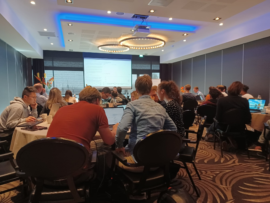 This year, we were lucky the MCEC school was a live event again! Although the event was originally planned in Apeldoorn, last-minute changes caused a change in location, and we all enjoyed the nice countryside of Zwolle.
This year, we were lucky the MCEC school was a live event again! Although the event was originally planned in Apeldoorn, last-minute changes caused a change in location, and we all enjoyed the nice countryside of Zwolle.
During this week, we could enjoy very nice and diverse lectures related to chemical and physical science, statistics, machine learning and data visualization. In between there was enough time to catch up or learn to know the new members.
The PhD teaches PhD session illustrated nicely how we can relatively easily learn from each other, and it also revealed that together we have a high knowledge density in complex chemistry and physics.
Two social activities, a pubquiz and karaoke on Monday evening and sport event on Wednesday afternoon, were organized by the C-team and showed the competitive sides of each and every one. Concluding, this week showed that the MCEC community is diverse, inspiring and fun, which perfectly reflects how we visualize modern science.
Text: Jim de Ruiter (UU)
Photos: Anne-Eva Nieuwelink
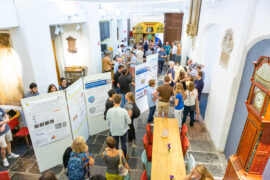 With this new date, we hope to put on an exciting conference, with great speakers and the opportunity to provide you, our guests, with the best scientific content you could wish for in two days.
With this new date, we hope to put on an exciting conference, with great speakers and the opportunity to provide you, our guests, with the best scientific content you could wish for in two days.
We are all looking forward to having a great real-life edition of Catalysis Connected on 15-16 September 2022!
Team Catalysis Connected
Visit catalysisconnected.nl for more information.
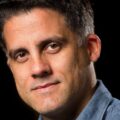 MCEC Member David Fernandez Rivas has received the Stairway to Impact Award. The award is one of five prizes that the NWO domain Science (ENW) presents this week to scientists who are an inspiration in the area of societal impact, team science, excellent science, diversity and communication.
MCEC Member David Fernandez Rivas has received the Stairway to Impact Award. The award is one of five prizes that the NWO domain Science (ENW) presents this week to scientists who are an inspiration in the area of societal impact, team science, excellent science, diversity and communication.
David is an adjunct professor in the Mesoscale Chemical Systems (MCS) department of the Science & Technology (ST) faculty at the University of Twente. He is mainly known for the development of an injection technique that reduces needle usage, by making the fluid itself the needle: it is ‘shot’ through the epidermis at high speed. Earlier this year, David also received the prestigious Prins Friso Ingenieursprijs Engineer of 2021, granted by the Royal Netherlands Society of Engineers for his work on bubbles for practical uses.
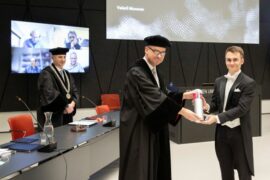 Modern society heavily relies on transportation. The internal combustion engines that power most vehicles emit gaseous pollutants that are harmful to human health and to the environment. Catalytic removal of toxic carbon monoxide (CO) from exhaust fumes is typically done with expensive noble metals as one of the key components of automotive catalytic convertors. For his PhD research, Valerii Muravev explored ways to improve the efficiency of costly catalysts by optimising the use of noble metals in convertors. Muravev recevied his PhD cum laude on November 26th 2021, many congratulations!
Modern society heavily relies on transportation. The internal combustion engines that power most vehicles emit gaseous pollutants that are harmful to human health and to the environment. Catalytic removal of toxic carbon monoxide (CO) from exhaust fumes is typically done with expensive noble metals as one of the key components of automotive catalytic convertors. For his PhD research, Valerii Muravev explored ways to improve the efficiency of costly catalysts by optimising the use of noble metals in convertors. Muravev recevied his PhD cum laude on November 26th 2021, many congratulations!
The purpose of this MCEC Lecture Series is to show our PhD candidates what the possibilities are after completing their PhD.
Upcoming lectures:
– January 2022: Ivan Devic – Software Engineer at Ericsson
– March 3 2022: Evgeny Uslamin – Start-up: CyberHydra
Have a look at the latest MCEC Publications (September – December 2021).
High-throughput activity screening and sorting of single catalyst particles with a droplet microreactor using dielectrophoresis
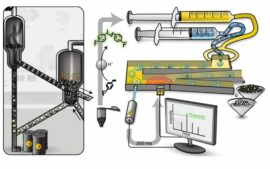 Anne-Eva Nieuwelink, Jeroen C. Vollenbroek, Roald M. Tiggelaar, Johan G. Bomer, Albert van den Berg, Mathieu Odijk and Bert M. Weckhuysen
Anne-Eva Nieuwelink, Jeroen C. Vollenbroek, Roald M. Tiggelaar, Johan G. Bomer, Albert van den Berg, Mathieu Odijk and Bert M. Weckhuysen
See the publication: Nature Catalysis, 9 December 2021, DOI 10.1038/s41929-021-00718-7
Detection of Spontaneous FeOOH Formation at the Hematite/Ni(Fe)OOH Interface during Photoelectrochemical Water Splitting by Operando X-ray Absorption Spectroscopy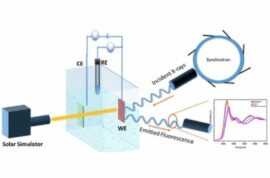
Ismail A.S.M, Garcia-Torregrosa I., Vollenbroek J.C., Folkertsma L., Bomer J.G., Haarman T., Ghiasi M., Schellhorn M., Nachtegaal M., Odijk M., van den Berg A., Weckhuysen B.M.
See the publication: ACS Catalysis Volume 11, Issue 19, Pages 12324 – 123351 October 2021
Towards controlled bubble nucleation in microreactors for enhanced mass transport
Ripken R.M.,Wood J.A., Schlautmann S., Günther A., Gardeniers H.J.G.E., Le Gac S.
See the publication: Reaction Chemistry and Engineering Open Access Volume 6, Issue 10, Pages 1869 – 1877 October 2021
Copper sulfide derived nanoparticles supported on carbon for the electrochemical reduction of carbon dioxide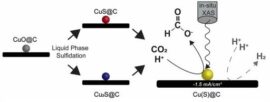
van Oversteeg C.H.M., Tapia Rosales M., Helfferich K.H. ,Ghiasi M., Meeldijk J.D., Firet N.J., Ngene P., de Mello Donegá C., de Jongh P.E.
See the publication: Catalysis Today Open Access Volume 377, Pages 157 – 1651 October 2021
Understanding Water-Zeolite Interactions: On the Accuracy of Density Functionals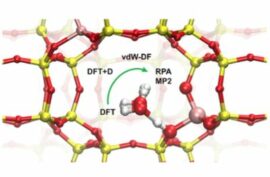
Stanciakova K., Louwen J.N., Weckhuysen B.M., Bulo R.E., Göltl F.
See the publication: Journal of Physical Chemistry C Volume 125, Issue 37, Pages 20261 – 2027423 September 2021
Ni-In Synergy in CO2Hydrogenation to Methanol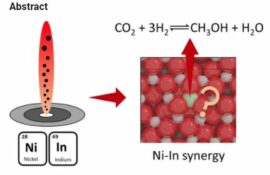
Zhu J., Cannizzaro F., Liu L., Zhang H., Kosinov N., Filot I.A.W., Rabeah J., Brückner A., Hensen E.J.M.
See the publication: ACS Catalysis Open Access Volume 11, Issue 18, Pages 11371 – 1138417 September 2021
Not electric, not hydrogen, but iron! According to Prof. Niels Deen (TU/e) this is the alternative to sustainable driving. In his lecture on ‘Universiteit van Nederland‘ he explains how rusty iron can help us to obtain a constant supply of energy:
–
20 November 2019
Prof. Bert Weckhuysen (UU) received this year’s highest award from the Max-Planck-Institut für Kohlenforschung. He visited the Mülheim Institute from 28 to 30 October to give three lectures, receive his award and be available to the scientists for exchange. Bert Weckhuysen has been honored for his outstanding achievements in the field of operando characterization of catalysts.
Read more about the Karl-Ziegler Guest Professorship.
–
29 October 2019